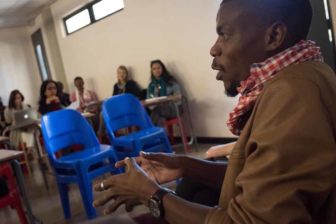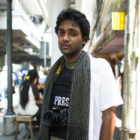
Lawrence Seretsi warns about fixers who are frauds or push a certain line or agenda. Picture: Daylin Paul
As dirty little secrets in journalism go, one of the relationships most filled with BS and one most often shoved under the carpet is that of the fixer-journalist and the foreign journalist.
Insights from a report by the Global Reporting Centre released today were the kicking off point for the GIJN Fixers and Foreign Correspondents session.
“The report has definitely touched on something that is a newsroom conversation that is almost never discussed but is one filled with huge tension,” says Peter Klein, founder and executive director of the non-profit Global Reporting Centre, who’s also professor at the University of British Columbia and a journalist who has worked as a fixer.
The gulf in perceptions between fixers and foreign correspondents is glaring for Klein and report co-author Dr Shayna Plaut.
“Seventy percent of foreign correspondents thought they never put fixers in danger, while 60% of fixers surveyed thought they were always put in harm’s way. Sixty percent of journalists said they never give credit to or acknowledged fixers in their stories, while 80% of fixers said they would have liked to have a credit on a story,” says Klein.
Klein and Plaut surveyed 450 people from 71 countries and 10% of respondents were contacted for follow-up interviews.
Klein says the report is a baby step in opening up the conversation about a complicated relationship that is in desperate need of re-examination. It will improve thing for fixers and for foreign journalists; it will also give readers and viewers understanding and context of the filters and even biases in the production of a story.
Sharing the morning’s panel with Klein were moderator Zoe Flood as well as Lawrence Seretse and Allen Yero Embalo. All the panelists have at some point worked as journalists and journalist-fixers.
Flood, a journalist based between London and Nairobi, says the relationship is one of power imbalance and often abuse. She says: “I think we need a new language so we can drop the word ‘fixer’, and local journalists also need to develop push-back to give editorial guidance, to negotiate better deals and to make sure they have sound contracts in place when they are asked to help foreign journalists.
“Foreign correspondents also can’t expect the local journalist to hand over all their contacts and do all the work for them,” she says.
At the same time, Seretse warns about fixer-journalists who turn out to be frauds or push a specific line or agenda. Sometimes the foreign journalist doesn’t find out till the story is published or aired and is proved to be phony.
“Sometimes the fixer’s contact is just his cousin who claims they know something, but they know nothing,” Seretse says.
It calls for new rules of engagement like developing best practice standards and more platforms for local journalists and fixers to be included. It also calls for stark reflection on a relationship that is grounded in the problematic western gaze on the developing world.
Working as a fixer remains a catch-22, admits Embalo, especially when payment in foreign currency can pay school fees and supplement paltry journalism wages. According to the report, fixers earn between $50 and $400 per day.
For someone like Embalo, his personal experiences have included having to flee his home country of Guinea Bissau to seek asylum in France with just a few euros in his pocket. He also recently had to receive the news of a fixer friend being killed while in the field in Mosul, Iraq.
This is reality, it’s also a life a million miles from an air-conditioned newsroom somewhere in a place like New York City, where journalists are protected by corporate insurance policies, evacuation plans, hazard training, kidnap training and financial and political muscle.
Top Tips
- Name and shame foreign correspondents and their companies if they don’t pay on time.
- Force editors to have the conversation about better protection for fixers and fixer-journalists. Editors can be office-bound and clueless.
- Demand a contract upfront.
- Negotiate issues like joint bylines, co-publishing and acknowledgement upfront.
 Ufrieda Ho is an independent journalist based in Johannesburg. She is author of Paper Sons and Daughters.
Ufrieda Ho is an independent journalist based in Johannesburg. She is author of Paper Sons and Daughters.
 Daylin Paul is an independent photographer, visual journalist and photojournalism educator based in Johannesburg, South Africa. He is the 2017 winner of the prestigious Ernest Cole Award for Photography for his ongoing documentary Broken Land and the 2017 Hostwriter Pitch Prize for Collaborative Journalism. His work has appeared in: The New York Times, The Guardian, Foreign Policy, Financial Times and Huffington Post. Daylin is also a trainer in the Photojournalism and Documentary Photography program at the Market Photo Workshop, a picture editor at The Con Mag and a freelance writer for the Mail and Guardian.
Daylin Paul is an independent photographer, visual journalist and photojournalism educator based in Johannesburg, South Africa. He is the 2017 winner of the prestigious Ernest Cole Award for Photography for his ongoing documentary Broken Land and the 2017 Hostwriter Pitch Prize for Collaborative Journalism. His work has appeared in: The New York Times, The Guardian, Foreign Policy, Financial Times and Huffington Post. Daylin is also a trainer in the Photojournalism and Documentary Photography program at the Market Photo Workshop, a picture editor at The Con Mag and a freelance writer for the Mail and Guardian.
